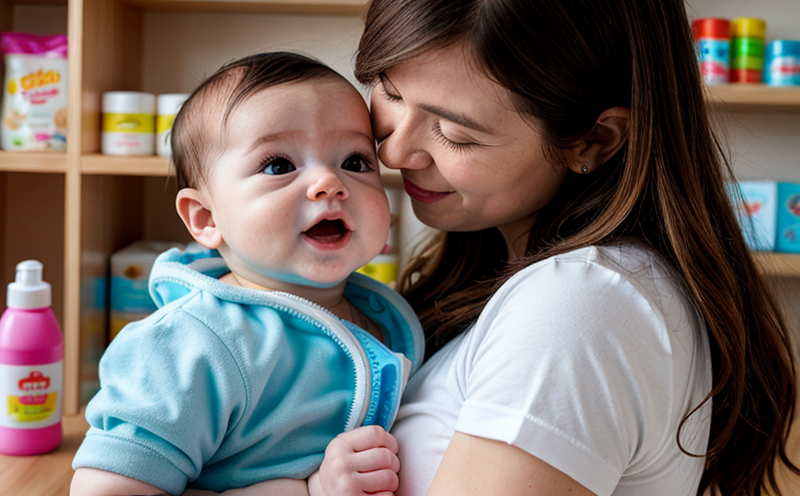Biodegradability Testing in Eco-Friendly Baby Products
In today’s increasingly environmentally conscious world, consumer products and baby products are no exception. The demand for eco-friendly alternatives is rising, driven by both consumer preferences and regulatory requirements. Biodegradability testing plays a crucial role in ensuring the sustainability of these products. This service focuses on assessing how quickly and effectively eco-friendly baby products biodegrade under controlled conditions.
Biodegradability refers to the ability of materials or compounds to be broken down by microorganisms into simpler substances, such as water, carbon dioxide, or biomass. For baby products, this is particularly important because these items are in close contact with infants and children, making it essential that they do not release harmful substances during degradation. This service ensures that eco-friendly materials used in baby products meet stringent biodegradability standards.
The testing process involves exposing the product to specific environmental conditions designed to mimic natural decomposition processes. These can include soil or aquatic environments where microorganisms naturally break down organic matter. The rate and extent of degradation are then measured, typically over a set period (e.g., 28 days). This helps manufacturers understand how their products will behave in real-world scenarios.
For instance, biodegradability tests can reveal whether the materials used in pacifiers, diapers, or baby wipes degrade within an acceptable timeframe. If not, this could indicate potential issues with product safety and environmental impact. By conducting such tests, companies can ensure that their eco-friendly claims are accurate and meet regulatory standards.
It’s important to note that biodegradability testing is not just about the final breakdown of materials but also about ensuring that any degradation products do not pose risks to human health or the environment. This includes checking for the presence of hazardous substances like heavy metals, volatile organic compounds (VOCs), and other harmful chemicals.
The testing process typically involves several steps:
- Sample Preparation: The product is prepared in a way that simulates real-world use. This might involve cutting the product into small pieces to accelerate degradation or placing it in specific environmental conditions.
- Incubation: Samples are incubated in controlled environments, such as soil or water, for an extended period (e.g., 28 days).
- Analysis: The samples are analyzed to determine the extent of biodegradation. This can include measuring the loss of mass or identifying changes in chemical composition.
The results of these tests provide valuable insights into the environmental impact of baby products and help guide product development towards more sustainable solutions. By ensuring that materials used in eco-friendly baby products are biodegradable, manufacturers can contribute to a healthier planet while maintaining safe and effective products.
Applied Standards
| Standard | Description |
|---|---|
| ASTM D5338-17 | Standard Test Method for Determining the Rate and Extent of Biodegradation in Soil of Compostable Plastic Materials. |
| EN 13432 | Biodegradable plastics - Requirements and test methods. |
| ISO 17556-1:2019 | Soil biodegradation of plastic materials - Part 1: Test method for determination of the composting process. |
| EN ISO 14855:2013 | Determination of the extent and rate of biodegradation in soil of plastic materials intended to be composted as part of waste management systems. |
Eurolab Advantages
At Eurolab, we provide comprehensive biodegradability testing services tailored specifically to the needs of eco-friendly baby products. Our team of experts uses state-of-the-art facilities and equipment to ensure accurate and reliable results.
- Comprehensive Expertise: With years of experience in environmental testing, our staff is well-versed in interpreting complex data and providing actionable insights.
- Accurate Results: Our advanced laboratories employ cutting-edge technology to ensure precise measurements and reliable outcomes.
- Regulatory Compliance: We stay up-to-date with the latest standards and regulations, ensuring that your products meet all necessary requirements.
- Custom Solutions: Whether you need biodegradability testing for a single product or an entire line of eco-friendly baby items, we offer customized solutions to fit your specific needs.
Why Choose This Test
The importance of biodegradability testing in eco-friendly baby products cannot be overstated. Here are several reasons why this test is crucial:
- Safety Assurance: Ensuring that materials degrade safely and do not release harmful substances into the environment.
- Regulatory Compliance: Meeting stringent environmental regulations and standards set by organizations like ASTM and EN.
- Innovation: Helping manufacturers develop new, sustainable products that meet both consumer expectations and regulatory requirements.
- Sustainability: Contributing to the overall sustainability of the product lifecycle from production to disposal.
- Consumer Trust: Building trust with consumers who are increasingly concerned about environmental impact.
- Brand Reputation: Enhancing your brand’s reputation as a leader in sustainable practices.





